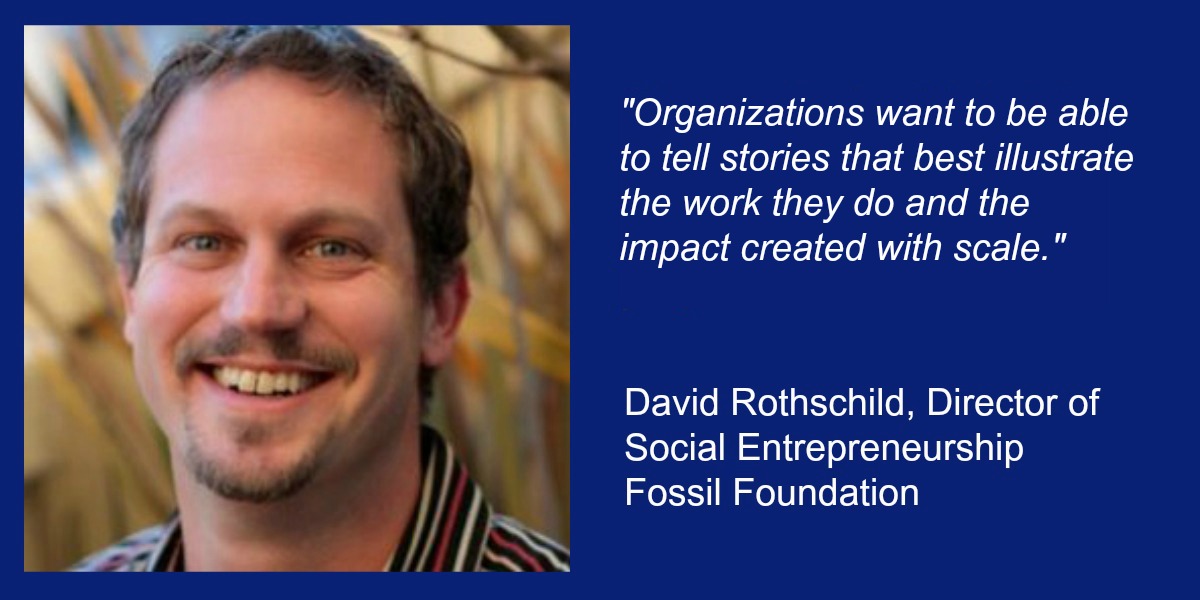“Helping Young People Chart Their Own Path” with David Rothschild, Fossil Foundation
David Rothschild is the Director of Social Entrepreneurship for the Fossil Foundation and leads the global grants program. He personally has over 20 years experience from first-hand, on the ground work to philanthropy and strategy. He has worked internationally in the Amazon during his career at the Skoll Foundation, working with indigenous people to enable them to advocate and participate in government-level land use planning. This experience readily translated to his current role that focuses on global grants programs to “unleash the potential of underserved youth.”
The Fossil Foundation is under the parent Fossil Group, known for its watches. The foundation seeks to form partnerships with institutions founded with innovative initiatives to further the progress of developing the potential of youth across the globe. They look for ways that their partnerships can be the most catalytic and find ways that Fossil’s capability can be leveraged whether through time, money or knowledge.
For instance, David shares a story about the College Summit, an initiative that seeks to increase student engagement in pursuit of college applications and graduation achievement. Fossil participated by enacting the use of their branding and marketing departments to create new logos and marketability for the program.
The Fossil Foundation’s story (in video on their website) seeks partnerships with programs that operate around a central innovation that transforms the lives of underserved youth. They look for evidence of impact around that innovation and their ability to show the trajectory and potential for systemic change.
We talk a bit about their involvement with a new digital platform developed to reach disconnected youth called LRNG, which offers young people opportunities to experience more than only what’s available in their own neighborhood. They have seen it as a national innovative solution from the very start and it’s already launched in 12 cities. David believes that LRNG has an amazing vision to have a deep and meaningful impact on improving the opportunity gap and what he calls our “learning deserts”.
We discuss education in general and David points out some of the troublesome facts around what is actually happening in early high school aged kids. We are failing our young people at the high school level on a grand scale when only a small percentage of them graduate and go on to college (20% go to college).
The Fossil Foundation also supports Equal Opportunity Schools, which is an organization that looks at student populations and the success rates in the different demographics and then go about trying to close the gaps.
Toward the end, we switch gears for a bit and David shares several poignant remarks from his unique, “funder’s perspective” for the relationship aspect between the funder and the organization receiving the funds. While appreciating that reporting is important, burdensome, specialized metrics that are created specifically for them are unnecessary. Quarterly updates with a simple dashboard of measures for their program and how it’s progressing is typical enough, along with a phone call about every 6 months.
He feels the most useful funding remains flexible and allows organizations to make the pivots needed to maintain the success of what they’re building through the work they do. If there are very specific metrics attached to the outcomes, that’s a different story (which is sometimes needed, especially for NGO’s).
There’s value in telling a story in different ways; from the beneficiary point of view and in terms of the impact that is happening with real human lives. And, there are some funders that only want to see the numbers and how you’ve managed to grow by using their dollars. You have to be able to talk to both of these types of funders – they are both important.
Systemic change is a large hurdle take on. Nearly one third of all youth are not being educated, employed or trained. Through scalability of tried and tested programs whose efforts further the goal of our youth being able to chart their own path, we can see opportunity for finding national and international support to make this change. It’s incremental now, but we are moving in the right direction.
David believes our next generation, with its focus on social responsibility, will be able to make great strides in reducing the systemic issues plaguing youth in general and underserved youth, in particular. They need the right amount of funds, technology and leeway to make their innovative ideas real.
That alone gives me hope.
Don’t forget to SUBSCRIBE to the Driven2Educate podcast so you’ll never miss an episode. Thank you!







